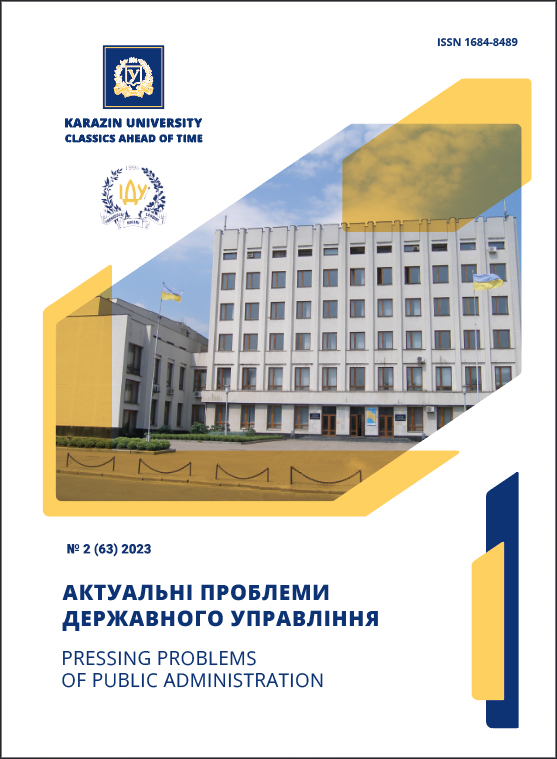The Crowdsourcing Concept and Crowd-Based Technologies as Principles for Increasing the Efficiency of Local Self-Government
Abstract
The article substantiates the relevance of the study of the concept of “crowdsourcing” and crowd-technology as a basis for increasing the efficiency of the functioning of local self-government. The conceptual and categorical apparatus of the determined subject of research is analysed. In particular: a variety of approaches to defining the concept of crowdsourcing (method, model, form, method, tool, technology, process, approach, practice, mobilization, etc.); approaches to understanding the phenomenon of crowd-technologies: managerial, marketing, financial-economic and informational. It is pointed out the forms of crowd-technology activities developed in the domestic practice of public authorities (labour activities, financial activities, optimization activities).
The leading principle of crowdsourcing is determined - self-organization, the ability of the community to produce an optimal solution in the discussion process. Attention is focused on such a feature of crowdsourcing as the participation of interested users of administrative services in the management of the territorial community, which involves direct participation in the development, adoption and implementation of management decisions regarding all those issues that relate to the well-being and life of the community, which radically changes the motivation and behaviour of participants in management relations
The list of principles of crowdsourcing determined by scientists was supplemented with the following principles: cooperation, partnership interaction with a wide range of actors, coordination of efforts to solve certain problems of local development; joint production of public goods and products; consensus orientation, strategic vision, response, accountability of authorities; innovativeness; recognition of the values of collective intelligence in solving problems, etc. The experience of implementing crowdsourcing projects at the local level was analysed, which were related to different goals in their essence, and therefore had a certain set of advantages for employees of local self-government bodies in Ukraine.
It is noted that crowdsourcing technologies change approaches to solving complex problems, at the same time act as the main tool for forming strategies for the development of territories, with the participation of interested users of administrative services, which radically changes their motivation and behavior, turning them into active participants in the management of the socio-economic development of the territorial community.
It was concluded that the concept of crowdsourcing was formed, the following was developed: a certain system of views on the understanding of the conceptual and categorical apparatus, the approaches were distinguished and the principles were determined, the observance of which makes it possible to master crowd technologies, depending on their type, type and scope of application, classifications were systematized for the use of certain crowdsourcing technologies in the management activities of public authorities.
Downloads
References
Use of crowdsourcing technologies in public city management. URL: https://jpl.donnu.edu.ua/article/view/11096 [in Ukrainian].
Vinnytsia - city of ideas: best practices for successful community problem solving: textbook (2020). L.L. Prikhodchenko (Ed.). Vinnytsia. [in Ukrainian].
Holka, V.Y. (2016). Civic-political crowdsourcing and crowdfunding as new forms of political activism: dissertation...candidate of political sciences; State Institution «South Ukrainian National Pedagogical University named after K.D. Ushynsky». Odesa. [in Ukrainian].
Encyclopedia of Modern Ukraine: world - society - culture; vol. 14 URL: https://esu.com.ua/article-3256 [in Ukrainian].
Znatkova, O.M. (2018). Methodology for the use of crowdsourcing technology in public administration in Ukraine. Theory and Practice of Public Administration, 4, 73–80. [in Ukrainian].
Karyi, O.I. & Panas, Y.V. (2016). Crowdsourcing as a management tool: examples of solving local problems. Herald of Lviv Polytechnic National University. Series: Problems of Economics and Management, 847, 213–219. URL: http://nbuv.gov.ua/ujrn/vnulpp_2016_847_34 [in Ukrainian].
Concept of integrated development of the city of Vinnytsia 2030: Decision of the Vinnytsia City Council of 02.22.2019 No. 1542. URL: <https://www.vmr.gov.ua/Branches/ContentLibrary/792eccf1-4802-4756-ae13-b2280969f6cf/314/%D0%A0%D1%96%D1%88%D0%B5%D0%BD%D0%BD
[in Ukrainian].
Maistrenko, O.V. (2017). Crowdsourcing: essence, types, principles and application tools. Economy and enterprise management, 9, 507–511. [in Ukrainian].
City of contents: Vinnytsia. URL: https://mistozmistiv.vn.ua [in Ukrainian].
Nikitenko, L. (2020). Crowdsourcing as an instrument of participatory democracy. Kyiv University Law Journal, 2, 133–138. DOI: https://doi.org/10.36695/2219-5521.2.2020.22
[in Ukrainian].
Nikitenko, L.O. (2021). Use of crowd-sourcing technologies in public city management. Political Institutions and Processes, 3, 36–41. DOI: https://doi.org/10.31558/2519-2949.2021.3.6
[in Ukrainian].
Prikhodchenko, L. (2023). Features of public control implementation during martial law in Ukraine: informational and communicative interaction. Current Issues in Modern Science. Series «Public Administration», 6/12, 234–246. URL: http://perspectives.pp.ua/index.php/sn/article/view/5094 [in Ukrainian].
On approval of the «Regulation on public expertise in the city of Vinnytsia»: Decision of the Vinnytsia City Council of 06.23.2017 No. 777. URL: https://cutt.ly/My68htT [in Ukrainian].
On approval of the «Program to promote the development of civil society institutions for 2015-2017»: Decision of the Vinnytsia City Council of 12.26.2014 No. 1980. URL: https://cutt.ly/ty6VNig [in Ukrainian].
On approval of the Regulation on local initiatives in the city of Vinnytsia: Decision of the Vinnytsia City Council of 06.23.2017 No. 778. URL: https://cutt.ly/Py64OKm [in Ukrainian].
On joining the European Charter for Equality of Women and Men in Local Life: Decision of the Vinnytsia City Council of 06.23.2017 No. 780. URL: https://cutt.ly/Oy67E9a [in Ukrainian].
Projects for community and regional development. URL: http://www.novakraina.org/menu/proekti-z-rozvitku-gromad-ta-regioniv [in Ukrainian].
Recommendation Rec (2001) 19 of the Committee of Ministers of the Council of Europe «On participation of citizens in local public life». URL: https://zakon.rada.gov.ua/laws/show/994_739#Tex [in Ukrainian].
Serhohin, S.M., Sharov, Y.P., Borodin, Y.I., Honcharuk, N.T., et al. (2016). Strategic development management of amalgamated territorial communities: innovative approaches and tools: monograph. Dnipro: DRIDU NADU. [in Ukrainian].
Brabham, D. (2008). Crowdsourcing as a model for problem solving: An introduction and cases. Convergence. The International Journal of Research into New Media Technologies, 14(1), 75–90.
Crowdsourcing: Why the power of the crowd is driving the future of business: book reviewed by Jeff Howe. (2009). New York: Crown Business.
Oliveira, F., Ramos, I., & Santos, L. (2010). Definition of a crowdsourcing innovation service for the European SMEs. In F. Daniel et al. (Eds.). Current trends in web engineering,
–416. Berlin/Heidelberg: Springer.

